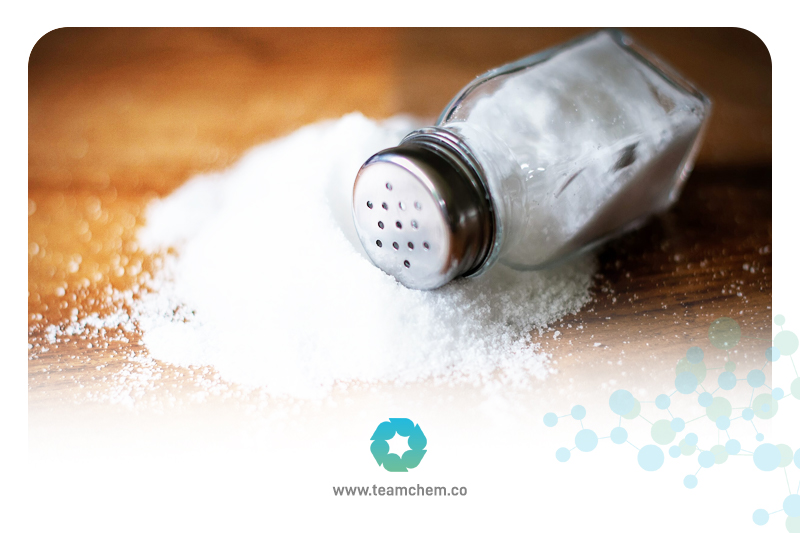Calcium Chloride in the Food Industry – A Closer Look
Calcium chloride, a versatile mineral compound, plays a crucial role in various industries, including the food sector. You might be surprised to learn that this seemingly industrial ingredient is actually a common and safe food additive, found in many everyday products. From enhancing texture and flavor to extending shelf life, calcium chloride provides numerous benefits for food manufacturers and consumers alike.
In this comprehensive guide, we'll delve deeper into the world of calcium chloride in food. We'll explore its various applications, safety profile, regulatory guidelines, and the numerous benefits it offers. Whether you're a food manufacturer, a curious consumer, or simply interested in learning more about food science, this article will provide valuable insights into the role of calcium chloride in the foods we eat.
What is Food-Grade Calcium Chloride and How is it Used in Food?
Food-grade calcium chloride is a type of salt composed of calcium and chlorine. It occurs naturally in some minerals and brines, but for commercial use, it's typically produced by reacting hydrochloric acid with calcium carbonate. This results in a white, odorless powder that readily dissolves in water.
This versatile compound is not all the same. Food-grade calcium chloride undergoes strict purification processes to ensure it meets stringent safety standards for human consumption. It differs from industrial-grade calcium chloride, which may contain impurities unsuitable for food applications.
Food manufacturers utilize food-grade calcium chloride in a variety of ways:
Firming Agent: It helps maintain the texture and firmness of fruits and vegetables during processing and storage,preventing them from becoming mushy.
Coagulation Aid: In cheese production, calcium chloride promotes the coagulation of milk proteins, resulting in a firmer curd and improved cheese yield.
Electrolyte Source: It's added to sports drinks and other beverages to replenish electrolytes lost during physical activity.
Flavor Enhancer: Calcium chloride can be used to enhance the salty or savory flavor of certain foods like pickles, without increasing sodium content.
Shelf Life Extender: It helps preserve the quality and freshness of canned goods, baked goods, and other processed foods by inhibiting the growth of spoilage microorganisms.
Dietary Sources of Calcium Chloride

Calcium chloride is naturally present in small amounts in some foods, and it's also added to certain processed foods. Dietary sources of calcium chloride include:
Dairy products: Milk, cheese, and yogurt naturally contain small amounts of calcium chloride.
Processed foods: Calcium chloride is often added to canned vegetables, processed meats, and some baked goods to improve texture, firmness, and shelf life.
Table salt: Some table salt brands may contain calcium chloride as an anti-caking agent.
It's worth noting that the amount of calcium chloride found in these sources is typically very small and not a significant contributor to overall calcium intake. For most people, a balanced diet provides sufficient calcium from various food sources.
Is Calcium Chloride a Safe Food Preservative?
Absolutely! Calcium chloride has a long history of safe use in food and is widely recognized as a safe food additive by major regulatory bodies worldwide.
FDA Approval: The U.S. Food and Drug Administration (FDA) has granted calcium chloride Generally Recognized as Safe (GRAS) status for its intended uses in food. This means it's been rigorously tested and evaluated for safety.
Global Recognition: Similar approvals exist from the European Food Safety Authority (EFSA) and other international organizations, confirming its safety for consumption.
Despite its safety record, some misconceptions exist regarding calcium chloride in food. Let's address a few common concerns:
Toxicity: When used within recommended levels, calcium chloride is not toxic. Like any substance, excessive consumption could lead to adverse effects, but the amounts used in food are far below those levels.
Health Concerns: Some worry about potential health risks, but extensive research has not linked calcium chloride to any significant health problems when consumed in moderation.
It's important to remember that food-grade calcium chloride is highly purified and distinct from the industrial grade.TEAMChem only provides high-quality, food-grade calcium chloride that adheres to all safety regulations, ensuring it's safe for use in your favorite foods.
Calcium Chloride in Pregnancy

During pregnancy, maintaining adequate calcium intake is crucial for both the mother's and baby's health. While calcium chloride is generally recognized as safe for consumption, it's important for pregnant women to consider a few factors:
Safe Consumption Levels:
Dietary Sources: Calcium chloride is naturally present in some foods and added to others. It's generally safe to consume these foods in moderation as part of a balanced diet.
Supplements: If considering calcium supplements, it's best to consult with a healthcare provider to determine the appropriate type and dosage. Calcium chloride supplements are not typically recommended for pregnant women due to potential side effects.
Potential Benefits and Risks:
Benefits: Adequate calcium intake during pregnancy is essential for fetal bone development and can help prevent complications like preeclampsia. However, there's no evidence to suggest calcium chloride offers any unique benefits over other forms of calcium for pregnant women.
Risks: Excessive calcium intake, regardless of the source, can lead to constipation, kidney stones, or interfere with the absorption of other minerals. It's crucial to follow recommended daily intake levels and avoid excessive consumption.
Recommendations:
Consult Your Doctor: Always discuss your dietary needs and supplement use with your doctor or a registered dietitian during pregnancy.
Focus on Food Sources: Prioritize calcium-rich foods like dairy products, leafy green vegetables, and fortified foods.
Consider Alternatives: If you need additional calcium, your doctor may recommend other forms of calcium supplements that are specifically formulated for pregnant women.
Calcium Chloride and Cancer Risk
Concerns have occasionally been raised about a potential link between calcium chloride and cancer, particularly stomach cancer. However, it's important to understand that these concerns are based on limited and inconclusive evidence.
While some observational studies have suggested a possible association between high salt intake (including calcium chloride) and stomach cancer risk, these studies cannot prove causation, and other factors like diet and lifestyle could play a role.
In fact, scientific studies have not established a direct causal relationship between calcium chloride consumption and an increased risk of cancer.
Major health organizations including the World Cancer Research Fund also do not list calcium chloride as a known carcinogen.
It's important to note that the amounts of calcium chloride used in food are very small and unlikely to contribute significantly to overall salt intake. Additionally, food-grade calcium chloride is highly purified and differs from industrial-grade calcium chloride, which has been associated with some health concerns in occupational settings.
Regulatory Guidelines for Calcium Chloride in Food
To address consumers’ concerns and ensure their safety, the use of calcium chloride in food is subject to strict regulations and standards:
Overview of Regulations:
EFSA (European Union): The European Food Safety Authority (EFSA) considers calcium chloride safe for use in food and has established maximum permitted levels for different food products.
FDA (United States): The U.S. Food and Drug Administration (FDA) also regulates calcium chloride as a GRAS substance, meaning it's generally recognized as safe when used according to good manufacturing practices. The FDA sets specific limits on the amount of calcium chloride allowed in various food categories.
Other Countries: Many countries have their own regulatory bodies and specific guidelines for calcium chloride use in food. It's essential for food manufacturers to be aware of and comply with the regulations in their respective regions.
Labeling Requirements:
Clear Identification: When calcium chloride is used as an ingredient, it must be clearly listed on the product label or under its E number (E509).
Allergen Information: While calcium chloride itself is not an allergen, it may be present in foods that contain other allergens. Manufacturers are required to provide clear allergen labeling to inform consumers.
Maximum Permitted Levels:
Vary by Food: The maximum permitted levels of calcium chloride vary depending on the type of food and its intended use. These levels are established based on extensive safety assessments and are designed to ensure consumer safety.
The Multifaceted Role of Calcium Chloride in Food
Calcium chloride is a versatile and safe food additive that plays a crucial role in numerous aspects of food production, from enhancing texture and flavor to extending shelf life. Its widespread use is supported by rigorous safety assessments and regulatory approvals from organizations like the FDA and EFSA.
While concerns about potential side effects or links to cancer have surfaced, scientific evidence does not support these claims when calcium chloride is consumed in moderation and sourced from reputable suppliers like TEAMChem.
As a vital component in various food products, calcium chloride contributes to:
Food Safety: By inhibiting the growth of harmful bacteria and preventing spoilage.
Food Quality: By maintaining texture, enhancing flavor, and preserving freshness.

Nutritional Value: By providing a source of calcium, an essential mineral for overall health.
Team Chemicals: Your Trusted Supplier of Food-Grade Calcium Chloride
When it comes to sourcing high-quality food-grade calcium chloride, TEAMChem is your reliable partner. We understand the unique needs of the food industry and are committed to providing safe, compliant, and effective solutions.
Our Expertise:
Sourcing Excellence: We leverage our extensive network and industry knowledge to source premium calcium chloride from reputable producers.
Quality Assurance: Our stringent quality control processes ensure that our calcium chloride meets or exceeds all relevant food safety standards and regulations.
Technical Support: Our team of experts is available to provide guidance on product selection, application, and regulatory compliance.
Custom Solutions: We offer various grades and forms of calcium chloride, including anhydrous, dihydrate, and liquid solutions, tailored to your specific needs.
Why Choose TEAMChem?
Reliability: We prioritize timely delivery and consistent product quality to keep your operations running smoothly.
Transparency: We believe in open communication and provide detailed product information, including certifications and technical specifications.
Customer Focus: Our dedicated customer service team is always ready to assist you with any inquiries or concerns.
Partner with Us
Discover the difference that high-quality, food-grade calcium chloride can make for your products. Contact TEAMChem today to discuss your requirements and request a quote. Let us be your trusted source for calcium chloride solutions that elevate your food production to new levels.